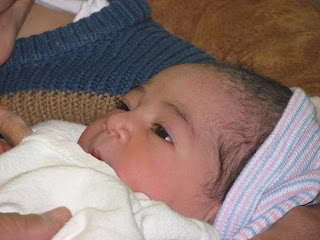Last night I received a text message from my dear friend Fida-"its coming down-its coming down!" she declared ecstatically. "Laila! the Palestinians destroyed Rafah wall, all of it. All of it not part of it! Your sister Fida."
More texts followed, as I received an periodical updates on the situation in Rafah, where it was 3 am.
"Two hours ago people were praising God everywhere. The metal wall was cut and destroyed. So was the cement one. It is great Laila, it is great" she declared.
For the first time in months, I sensed a degree of enthusiasm, hope...relief even, emanating from thousands of miles away, via digitized words, from Gaza. Words that have been all but absent from the Palestinian vocabulary. Buried. Methodically and gradually destroyed.

[Palestinians stock up on fuel in Egypt's Arish. Picture by Fida Qishta]
Of course the border opening will only provide temporary relief, and the ecstasy it generates will be fleeting,
as it was in 2005 when shortly after Israel's Disengagement, the once impervious and deadly, sniper-lined border became completely porous. It was an incredible time. I will never forget the feeling of standing in the middle of the Philadelphi corridor, as it was known.
Of standing there with hundreds of thousands of other Gazans, savoring the moment of uninterrupted freedom, in this case, freedom of movement. Goats were being lobbed over the secondary fence; mattresses; cigarettes; cheeses. Egyptians took back bags of applies from northern Gaza, and comforters. For two weeks, it was the free market at work.

[The Rafah Wall, from the Palestinian side. Picture by Laila El-Haddad]
Once a nesting ground for Israeli tanks, armored bulldozers, and the like-all of the war metal-the face of the occupation- that became synonymous with destructions and death for us in Gaza, and particularly for the resident's of Rafah, Philadelphi had so suddenly become nothing but a a kilometre of wasteland, of sand granules marking the end of one, battered, besieged land, and the beginning of the rest of the world.
But traveling this short distance had previously been so unthinkable, that the minute it took to walk across it by foot was akin to being in the twilight zone. You couldn't help but feel that at any moment a helicopter gunship would hover by overhead and take aim.
It was then that I met a pair of young boys, 9 and 10, who curiously peered over the fence beyond the wall, into Egypt. In hushed whispers, and innocent giggles they pondered what life was like outside of Gaza and then asked me: Have you ever seen an Egyptian? What do they look like? They had never left Rafah in their lives.

[picture by Laila El-Haddad]
And so once again, this monstrosity that is a source of so much agony in our lives, that cripples our movement and severs our ties to each other and to our world, to our families and our homes, our universities and places of work, hospitals and airports, has fallen through the will of the people; and sadly, once again, it will go up. Of course, Mubarak has tried to take credit for this, blabbering something about how they let them open it because Gazans were starving, while arresting 500 demonstrators in Cairo for speaking their mind against the siege.
The border opening also will not provide Gazans with an opportunity to travel abroad, b/c their passports will not have been stamped leaving Gaza, but it will at the very least give them some temporary respite from the siege. I emphasize temporary because this too, just like Israel's on again-off again fuel stoppages is not going to resolve the situation. Allowing in enough supplies to prevent a humanitarian catastrophe, in the words of the Israeli security establishment, somehow makes sense in the logic of the occupation; as does escalation; and cutting fuel in response to rocket attacks. And Israelis can all learn to forget Gaza, at least long enough to feel comfortable.
People often ask me why such things-meaning people powered civil protests that can overcome even the strongest occupation- don't happen sooner, or more often, or at all for that matter. We underestimate the power of occupation to destroy a people's will to live, let alone resist and and attempt to change the situation. This is the worst thing about occupation, whether a military occupation like Israel's, or a political one like Hosni Mubarak's in his own country. And it is only when you can overcome the psychological occupation, the occupation of the mind, that the military occupation in all its manifestations can be defeated.
















